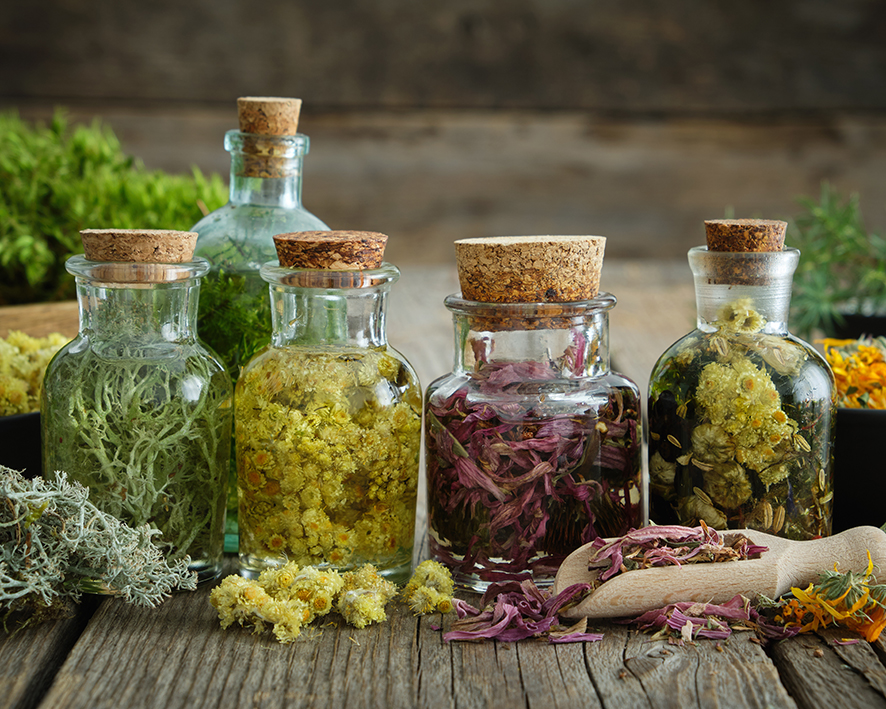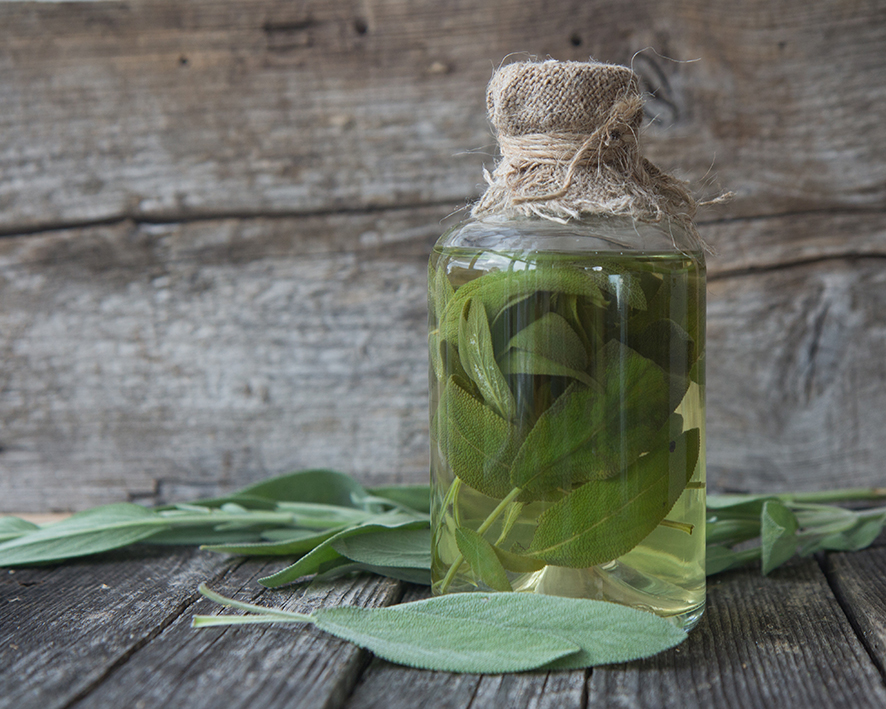Homemade herbal extracts
Homemade herbal extracts are worth using when creating natural cosmetics. Don't know what it is? Let's explain it together.
Homemade herbal extracts are one of the ways to enrich your cosmetics with the active substances found in these plants. Commonly used are extracts based on glycerin or ethanol (alcohol),
each of these types of extracts has its pros and cons. Below, we will review the methods of making homemade herbal extracts, their dosage and use.

HOMEMADE HERBAL EXTRACTS - WHAT ARE THEY?
Homemade herbal extracts are concentrated extracts of plants. The name implies that they are obtained by extraction from dried or fresh herbs using various extracting agents. Often these are
ethanol or glycerine, which have the ability to extract certain active substances from plants.
The preparation of homemade herbal extracts is not very complicated and can be done at home. On the other hand, homemade herbal extracts differ from those bought from batch to batch, at the same time you do not have at your disposal information on dosage, stability, pH or optimum dosing temperature, etc., which is normally supplied by the manufacturer.
Therefore, it is also necessary to use homemade herbal extracts in smaller doses or to prepare several samples of the product with different concentrations of homemade herbal extracts and to monitor the stability of the resulting product or its tolerance by the skin. Since homemade herbal extracts contain plant extracts, they have allergenic potential in sensitive people, so it is always a good idea to also perform a skin test to determine potential allergy to the plant.
GLYCERIN-BASED HOMEMADE HERBAL EXTRACTS
Homemade glycerin-based herbal extracts are gaining in popularity, mainly due to the fact that they do not contain ethanol, which can be a skin irritant. On the other hand, glycerin is a slightly weaker extracting agent than ethanol, so when using glycerin, a hot extraction procedure is also chosen to increase the proportion of extracted substances. On the other hand, some heat-sensitive substances of herbs may be damaged or destroyed by heat.
DOMESTIC HERBAL EXTRACTS BASED ON GLYCERINE - HOT PRODUCTION
1. disinfect all containers and utensils that come into contact with the extract and raw materials.
2.prepare a mixture of distilled water and dried herbs in a 2:1 ratio (water:herbs). Chop or finely grind the dried plants for homemade herbal extracts before extraction to speed up the extraction process.
3.keep at a gentle simmer in a covered container for 30 minutes, up to a maximum of 2 hours if you like,
the plant requires a longer extraction time. You can also add water from time to time until it evaporates to avoid dry boiling.
4. strain the mixture through a sieve or cheesecloth, noting the weight of the resulting concentrated extract.
5.in an adjacent container, prepare a 1:4 mixture of distilled water and glycerine. Dilute the concentrated herbal extract 1:10 (extract:glycerine solution) with this mixture.
The finished homemade herbal extracts should last without the use of a preservative due to the high glycerin content. However, if microbial contamination happens to occur, use a preservative as well.
HOMEMADE HERBAL EXTRACTS BASED ON GLYCERINE - COLD PRODUCTION
The other option to extract using glycerin is to use the cold method. In this case, there is no heat damage to some of the sensitive substances in the herbs. On the other hand, homemade herbal extracts based on glycerine produced cold have a slightly lower content of the extracted substances, since, as has been mentioned, glycerine is a weaker cold extracting agent than alcohol.
1. disinfect all containers and utensils that come into contact with the extract and the raw materials.
2.put 2/3 of the fresh or ½ of the dried herbs, finely chopped, into a jar.
3. pour the pure glycerine over the herbs so that they are completely submerged and there are no bubbles in the mixture.
Close the jar.
4.leave the herbs to extract for 4-6 weeks, shaking occasionally. Then strain the mixture to obtain homemade glycerin-based herbal extracts.
When extracting with cold glycerin, the resulting extract tends not to be diluted precisely because the boil, which would otherwise concentrate the extract, has been omitted.

HOME-MADE HERBAL EXTRACTS BASED ON ETHANOL (ALCOHOL)
Homemade herbal extracts based on alcohol have the advantage that they can be prepared simply cold and will be rich in active substances due to the good extracting power of ethanol. On the other hand, when extracting, always use pure ethanol, at least 95%, which is also undenatured. Undenatured ethanol is more difficult to obtain, on the other hand some denaturing agents can be toxic and unsuitable for application to the skin, so they should be avoided.
HOMEMADE HERBAL EXTRACTS BASED ON ETHANOL - COLD PRODUCTION
1. disinfect all containers and utensils that come into contact with the extract and raw materials.
2. mix ethanol and finely chopped dried herbs in a 2:1 ratio in a container. Close the container airtight, e.g. with cellophane secured with adhesive tape (unless the container has a lid)
and leave to extract for 1 week.
3.after a week, strain the mixture through a sieve or gauze to obtain a concentrated extract. Weigh the extract.
4.in another container, prepare a 2:3 mixture of distilled water and ethanol. Pour the concentrated extract over the prepared ethanol solution in a ratio of 1:10 (extract:ethanol solution). In this way, you will obtain homemade alcohol-based herbal extracts.
HOMEMADE HERBAL EXTRACTS BASED ON GLYCERINE - USE IN COSMETICS
If you have already prepared homemade herbal extracts, it's time to use them in cosmetics. The use of individual extracts in specific products depends on several factors. These are mainly the compatibility
with other raw materials, the optimal pH and temperature or the maximum concentration.
Since you prepare herbal extracts at home, you do not have information from the manufacturer about the aforementioned parameters and properties of the extract. Therefore, in general, homemade herbal glycerine extracts should be added at temperatures below 40 °C to avoid damaging the valuable plant substances.
As glycerin is a water soluble substance, domestic herbal extracts based on glycerin include
water-based or water-phaseproducts. They are best added to products that do not have extreme pH values; most extracts tolerate pH values in the range of 4-7 well.
The concentration of a given extract used depends not only on how much your skin can tolerate,
but the concentration also affects the stability of the product, especially emulsions and gels. It is recommended not to exceed a concentration of 5% extract, it is best to start with 1% extract and if the product is stable, prepare the next batch with a higher proportion of extract.
ALCOHOL-BASED HOMEMADE HERBAL EXTRACTS - USE IN COSMETICS
Homemade alcohol-based herbal extracts are also applicable in cosmetics. However, ethanol is more irritating to the skin than glycerin, so the trend nowadays is to minimize the proportion of ethanol extracts in cosmetics.
At the same time, working with ethanol extracts is more challenging that other raw materials in the product,
e.g., actives, tensides, thickeners, etc., may not tolerate the presence of ethanol well
and may cause precipitation of the substances or breakdown of the emulsion, etc. Therefore, always check that the other ingredients in the product can be combined with ethanol. Alcohol dissolves well in water, so add extracts to the aqueous phase or to water-based products.
Again, it is a good idea to add homemade herbal extracts at temperatures below 40°C to avoid evaporation of the ethanol and heat damage to the active ingredients in the extract. Start as with glycerin extracts with a concentration of 1% and if the product is stable and well tolerated by the skin, increase the concentration but do not exceed 5%. Usually, however, homemade ethanol-based herbal extracts are used
in lower concentrations than glycerin-based ones.
As this is home-made, you do not have the manufacturer's data on optimum pH, temperature, usability, etc. Therefore, it is a good idea to prepare several batches of the product with different concentrations of the extract and monitor their stability and tolerability by the skin.
HOMEMADE HERBAL EXTRACTS AND CONCLUSION
So friends, have you tried making such a homemade herbal extract at home?
If so, be sure to let us know how you did, what you worked with and how you continue to use these extracts. We are looking forward to your insights.
Do zmydelnenia, friends.


